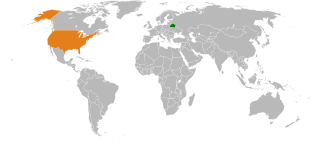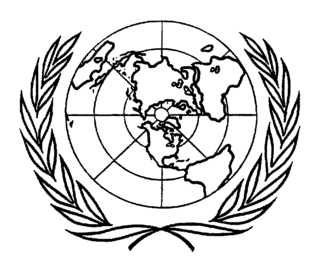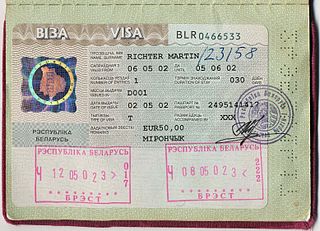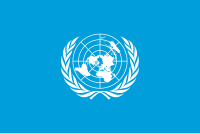
Belarus, officially the Republic of Belarus, is a landlocked country in Eastern Europe. It is bordered by Russia to the east and northeast, Ukraine to the south, Poland to the west, and Lithuania and Latvia to the northwest. Covering an area of 207,600 square kilometres (80,200 sq mi) and with a population of 9.2 million, Belarus is the 13th-largest and the 20th-most populous country in Europe. The country has a hemiboreal climate and is administratively divided into six regions. Minsk is the capital and largest city; it is administered separately as a city with special status.

The Armed Forces of the Republic of Belarus consist of the Ground Forces and the Air Force and Air Defence Forces, all under the command of the Ministry of Defence of Belarus. As a landlocked country, Belarus has no navy.

The Byelorussian SSR was one of only two Soviet republics to be separate members of the United Nations. Both republics and the Soviet Union joined the UN when the organization was founded in 1945.

The Byelorussian Soviet Socialist Republic, also known simply as Byelorussia, was a republic of the Soviet Union (USSR). It existed between 1920 and 1991 as one of fifteen constituent republics of the USSR, with its own legislation from 1990 to 1991. The republic was ruled by the Communist Party of Byelorussia and was also referred to as Soviet Byelorussia or Soviet Belarus by a number of historians. Other names for Byelorussia included White Russia or White Russian Soviet Socialist Republic and Belorussian Soviet Socialist Republic.

The national flag of Belarus is a red-and-green flag with a white-and-red ornament pattern placed at the hoist (staff) end. The current design was introduced in 2012 by the State Committee for Standardisation of the Republic of Belarus, and is adapted from a design approved in a May 1995 referendum. It is a modification of the 1951 flag used while the country was a republic of the Soviet Union. Changes made to the Soviet-era flag were the removal of communist symbols – the hammer and sickle and the red star – as well as the reversal of the colours in the ornament pattern. Since the 1995 referendum, several flags used by Belarusian government officials and agencies have been modelled on this national flag.

The president of the Republic of Belarus is the head of state and head of government of Belarus. The office was created in 1994 with the passing of the Constitution of Belarus by the Supreme Council. This replaced the office of Chairman of the Supreme Council as the head of state. The tasks of the president include executing foreign and domestic policy, defending the rights and general welfare of citizens and residents, and upholding the Constitution. The president is mandated by the Constitution to serve as a leader in the social affairs of the country and to act as its main representative abroad. The duties, responsibilities and other transitional clauses dealing with the presidency are listed in Chapter Three, Articles 79 through 89, of the Constitution.

Interstate relations between the United States and Belarus began in 1991 upon the dissolution of the Soviet Union, of which Belarus had been a part. However, the relations have turned sour due to accusations by the United States that Belarus has been violating human rights. Belarus, in turn, has accused the United States of interfering in its internal affairs.

The Belovezha Accords is the agreement declaring that the Union of Soviet Socialist Republics (USSR) had effectively ceased to exist and establishing the Commonwealth of Independent States (CIS) in its place as a successor entity. The documentation was signed at the state dacha near Viskuli in Belovezhskaya Pushcha, Belarus on 8 December 1991, by leaders of three of the four republics which had signed the 1922 Treaty on the Creation of the USSR:

The United Nations Conference on International Organization (UNCIO), commonly known as the San Francisco Conference, was a convention of delegates from 50 Allied nations that took place from 25 April 1945 to 26 June 1945 in San Francisco, California, United States. At this convention, the delegates reviewed and rewrote the Dumbarton Oaks agreements of the previous year. The convention resulted in the creation of the United Nations Charter, which was opened for signature on 26 June, the last day of the conference. The conference was held at various locations, primarily the War Memorial Opera House, with the Charter being signed on 26 June at the Herbst Theatre in the Veterans Building, part of the Civic Center. A square adjacent to the Civic Center, called "UN Plaza", commemorates the conference.

The Ministry of Foreign Affairs of the Republic of Belarus is the Belarusian government ministry which oversees the foreign relations of Belarus.

Currently, Belarus has an embassy in Riga, while Latvia has an embassy in Minsk. The countries share 161 km as it relates to their common border. In May 2021 the relations were de facto terminated as both countries were expelling each other's diplomats of the corresponding embassy, Latvia was insisting to use an inaccurate opposition flag as a representation for Belarus in the Ice Hockey World Championship in Riga over the Ryanair Flight 4978 diplomatic row. Belarusian Foreign Minister Vladimir Makei called Latvia's move 'an act of international vandalism' and called for an apology and return the legal green, red and white flag to its original place. The Belarusian government reacted with expelling every Latvian diplomat including the Ambassador inside the country, with Latvia following with the same response. The Zurich-based International Ice Hockey Federation sided with Belarus and asked the mayor of Riga to urgently take down the IIHF flags to protest to what the body called a political gesture.

Visitors to Belarus must obtain a visa from one of the Belarusian diplomatic missions unless they come from one of the visa exempt countries or if their visa had been approved in advance for collection on arrival.

International recognition of Transnistria – a disputed region in Eastern Europe located between Moldova and Ukraine – is controversial. Although Transnistria declared independence in 1990, no United Nations member recognises its sovereignty and the region is considered by the UN to be part of Moldova. Currently, only Abkhazia, the Republic of Artsakh and South Ossetia recognise its independence, all themselves states with limited recognition. Despite not officially recognizing Transnistria's independence, Russia has close relations with Transnistria and even established a consulate in the territory. The Council of Europe considers the region a Russian-occupied territory.

Independence Day of the Republic of Belarus, also known as Republic Day or Liberation Day is a public holiday, the independence day of Belarus and is celebrated each year on 3 July. Independence Day is a non-working day.

This is a list of the Permanent Representatives of Ukraine to the United Nations. Permanent Representative is the head of the permanent mission of Ukraine to the United Nations.
Ukraine was one of the founding members of the United Nations when it joined in 1945 as the Ukrainian Soviet Socialist Republic; along with the Byelorussian Soviet Socialist Republic, Ukraine signed the United Nations Charter when it was part of the Soviet Union. After the dissolution of the Soviet Union in 1991, the newly independent Ukraine retained its seat.

Belarus–NATO relations refers to relations between the Republic of Belarus and the North Atlantic Treaty Organization (NATO).
Alyaksandr Alyaksandravich Kucalaj, is a Belarusian diplomat and who had served as an ambassador of Belarus to Vietnam from 2004 to 2010.















